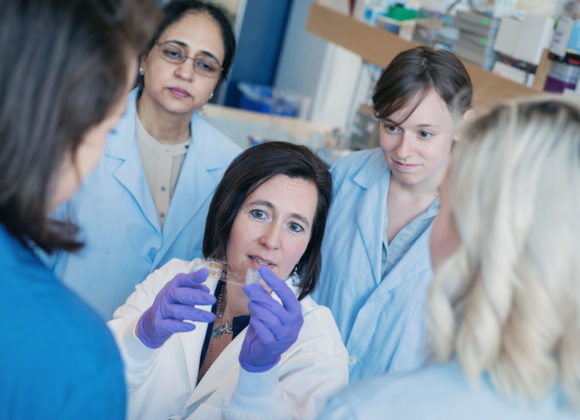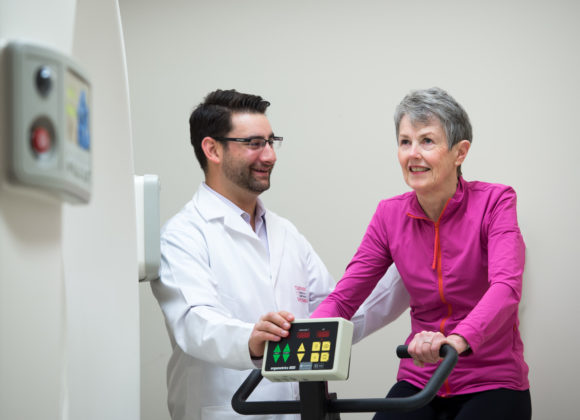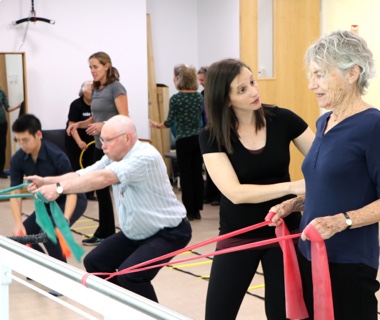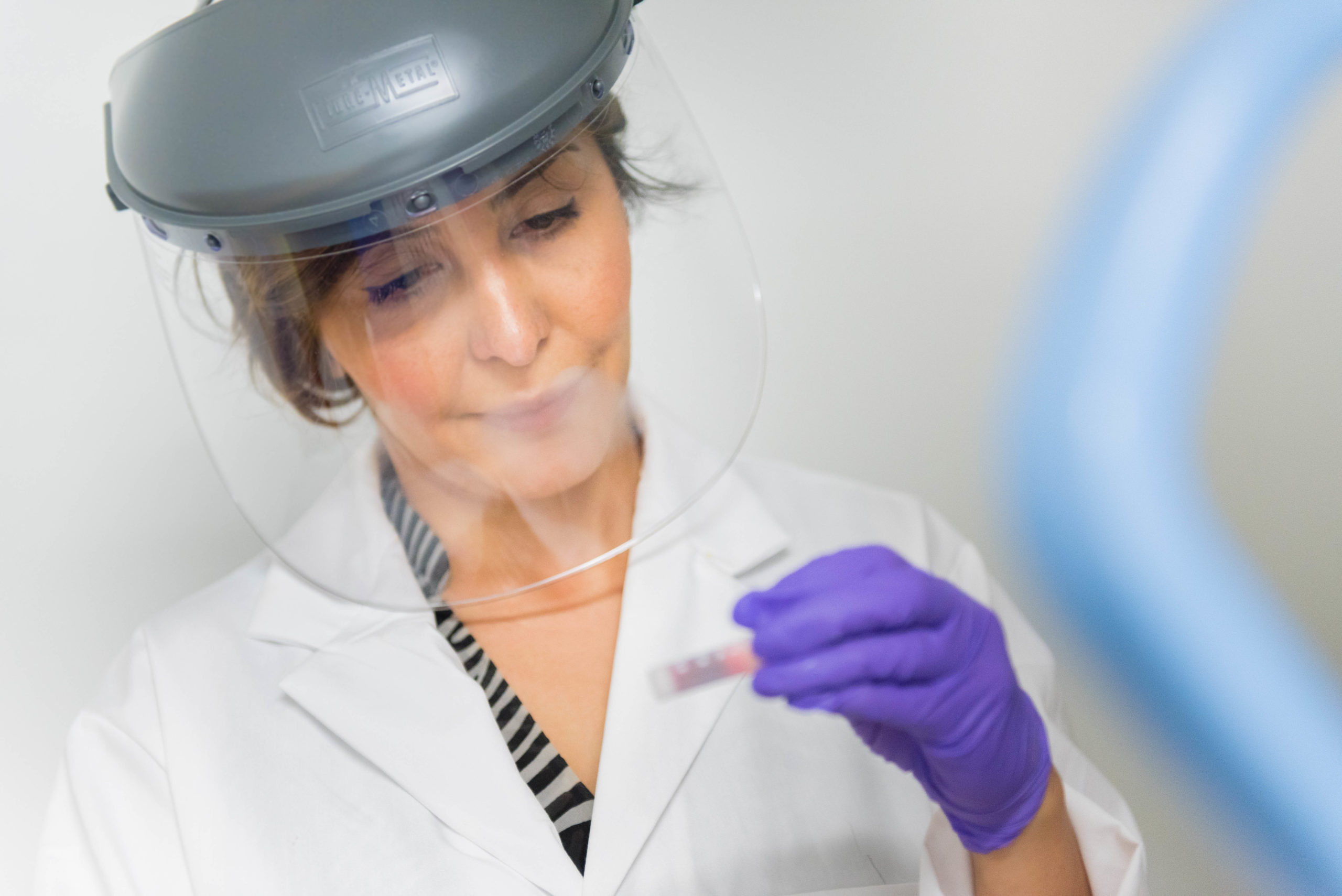Donate Funds
The campaign for the Djavad Mowafaghian Centre for Brain Health is a collaborative effort and priority fundraising initiative for the UBC Faculty of Medicine and the VGH & UBC Hospital Foundation.

Donate via UBC Faculty of Medicine
Please see details below if you are interested in donating through the UBC Faculty of Medicine. For any questions, please contact Erin Bartlett.
Donate Now
Donate via VGH + UBC Hospital Foundation
Please see details below if you are interested in donating through the VGH + UBC Hospital Foundation. For any questions, please contact John Andru.
Donate NowJohn Andru
Director, Campaigns, VGH & UBC Hospital Foundation
Donate Your Time
There are many opportunities to participate in research. Opportunities specific to the Centre are listed below. New research projects come up often, so be sure to check back regularly.
To connect with research opportunities across the province visit:

Current Opportunities
Participate in ongoing research studies and clinical trials led by Djavad Mowafaghian Centre for Brain Health scientists.
This study aims to investigate whether a specific combination of biomarkers can serve as predictors for how individuals experiencing a major depressive episode will respond to treatment.
Middle Ear Lab is conducting a study entitled “Long-term health effects of COVID-19 on the auditory and vestibular system.” Please consider helping us by volunteering as a participant in our study. To be eligible for this study, you should have a history of positive Polymerase Chain Reaction (PCR) or antigen test for COVID-19 virus three or more months ago.
Purpose: The primary goal of the proposed study is to establish a relationship between COVID-19 and hearing and balance impairments that can be used to devise intervention strategies to avoid further complications of hearing and balance problems.
How long will it take? It takes about five hours to complete a clinical hearing test and balance assessment. All tests will be conducted in two to three sessions at a time that is convenient for you.
Where should I go? Most testing will be completed in the Middle Ear Lab on the UBC campus in the IRC building. One test of balance assessment will be conducted at Dr. Eytan David’s clinic, one of the collaborators of this study, at 1221 Lonsdale Ave #101B, North Vancouver
What would I learn from these tests? You will have a complete hearing and balance check-up. As a participant in this pilot study, you will not be paid. However, you get full audiological and balance assessments without any cost Full audiological and balance assessments are provided at high cost in clinics. The results of this assessment will be communicated to you. Proper referral to your family physician will be done if indicated.
For more information about the study or to arrange for your participation, please contact the Middle Ear Lab at mel@audiospeech.ubc.ca to set up an appointment.
Dr. Manu Madhav’s lab is recruiting research volunteers to perform a virtual reality (VR) task where you will navigate a virtual 3D environment using a VR headset and controllers.
This will help us:
-
Understand how navigation behaviours change with aging and increasing task complexity
-
Develop a task that can measure cognitive decline during dementia
-
Compare human strategies with rats, who will run an analogous task on our physical, custom-built maze
During this study, you will navigate a maze in VR, while trying to remember the location of various landmarks. You will also be asked to provide some basic demographic information, as well as complete brief neuropsychiatric and cognitive assessments with one of our researchers. The study should take around 90 minutes to complete, and you will be offered $10.00 to cover transportation costs.
Participation Criteria:
-
Age 18 and up
-
Normal or corrected to normal vision
-
NO diagnosis of epilepsy or cognitive impairment
-
NOT prone to motion sickness, or have diagnosed vestibular discomfort
For more information about the study or to arrange for your participation, please contact the lab at nc4.recruit@ubc.ca or by phone at 604-827-3118.
Are you living with Multiple Sclerosis, aged between 30 and 65, and have maintained clinical stability for the past three months?
Join the MS-Detect study to assist in the validation of MSCOPILOT® Detect, a mobile application designed to monitor MS symptoms. By using the MSCOPILOT® Detect mobile app both at home and in the clinic with the study doctor, you can contribute to improving our understanding of Multiple Sclerosis progression.
To learn more, contact:
604-822-1756
MS.NMO_Research@ubc.ca
Researcher: Alexander Cook (Graduate student), Meriwether Morris (RA), Debbie Giaschi (PI) and Hee Yeon Im (PI)
Description: This study seeks to evaluate participants’ learning of new motor movements through a behavioural task. You will first complete a few short visual assessments, followed by a computer task while being seated in an MEG scanner. Before you enter the scanner, we will place sensors along your hairline and just below your eyes.
Eligibility: 6-10 years of age and have normal or corrected-to-normal vision
Location:
SFU Imagetech Facility, Surrey Memorial Hospital
13750 96 Ave
Surrey, BC V3V 1Z2
Contact Information: Please email Meriwether at ubcvcnlab@bcchr.ca
Reimbursement/Time: The study will be conducted in one session, lasting between an hour to two hours. You will receive $60 for your participation.
Do you have NMOSD or MOGAD?
Join a Canada-wide study that monitors clinical trends and responses to therapy in NMOSD, MOGAD and other atypical demyelinating disease populations over time. This is an observational study that follows patients at their annual clinic visits and aims to better understand disease patterns and improve quality of life for people living with these conditions.
To learn more, contact:
604-822-1756
MS.NMO_Research@ubc.ca
In this study, we investigate how human observers recognize complex visual patterns and objects such as letters and faces. You are invited to participate in this study because we would like to understand how visual recognition is normally accomplished in healthy human observers. Participants will be seated comfortably in front of a computer screen where they will view displays of visual stimuli. Participants will then be asked if they recognize the stimuli.
Eligibility: Participants should have normal or corrected to normal vision and hearing. Must be 19 years or older.
Location: ICORD at Vancouver General Hospital; 818 W 10th Ave, Vancouver, BC V5Z 1M9
Researcher: Dr. Ipek Oruc (Principal Investigator); Caitlin Long (Graduate Research Assistant)
Contact Information: Caitlin Long; caitlong@student.ubc.ca
Reimbursement/Time: The study will take approximately 1 hour, and participants will be compensated $10.
The UBC B.R.A.I.N. lab is looking for participants for a clinical trial to evaluate the efficacy and safety of psilocybin-assisted psychotherapy in adults with Alcohol Use Disorder (AUD). The preliminary trial results concerning this therapy have been encouraging and no serious adverse effects have been observed.
The trial will enroll individuals with alcohol dependence. Current alcohol consumption should be heavy to qualify for the Study. The total duration of the trial will be approximately 29 weeks including 13 visits to the trial site and laboratory visits.
You may be eligible for the trial if:
• You are over 19 years old
• You have alcohol dependence
• You use alcohol almost daily and in large amounts
• You wish to decrease the number of occasions on which you drink and/or the number of alcohol units you consume
• You do not use narcotics, Antabuse, naltrexone or mood-altering medications and you do not have hepatitis or liver or kidney failure or serious heart problems and you do not suffer from major depression
• It is possible for you to arrange a caregiver to accompany you for 24 hours after the drug administration
• You are not pregnant
If you are interested in participating, follow this link to see if you are eligible: https://flex.redcap.ubc.ca/surveys/?s=M4ETYE9YPCKMKWDL
If you are interested in participating or have any questions, please contact Cassie Choles (choles@student.ubc.ca)
This study investigates whether adding Cannabidiol (CBD) to the current medications of people diagnosed with bipolar disorder improves symptoms of depression over a 6-week period compared to a placebo. We are seeking people diagnosed with bipolar disorder (type 1 or 2) who are 19-70 years of age, currently experiencing a depressive episode, and taking a medication for mood stabilization (lithium, valproate/epival, risperidone, olanzapine, quetiapine, aripiprazole, ziprasidone, lamotrigine or a combination of these). The study involves clinical questionnaires, blood samples, and tests of memory, attention, and concentration. Compensation will be provided for participation. For more information, please email bipolar.research@ubc.ca or call at 604-822-8045.
More information can also be found at: https://bit.ly/UBCCBD
The Neuroscience, Engagement, and Smart Tech (NEST) lab at UBC is currently recruiting for a project looking at the impact of social robot use on older adults. The goal of the project is to co-create an evidence-based outcome measure for the use of social robots in dementia care. The Principal Investigator for this study is Dr. Julie Robillard, and the study is called “Co-creating an Outcome Measure For sOcial RoboTs in dementia care” (COMFORT).
They are currently looking for people lived experience of dementia, care partners of people with a lived experience of dementia, health care providers who work with individuals with dementia, roboticists, and measurement experts to participate in a 2-hour online workshop. Please note the use of video is required to verify the identity of participants.
If you are interested in participating:
- register your interest here: https://ubc.ca1.qualtrics.com/jfe/form/SV_daR5ri2KdsSOzJQ
- or email Susanna Martin, NEST lab research assistant at susanna.martin@ubc.ca.
We are currently recruiting individuals to participate in the Decisions on Driving program and provide feedback on its content. This is a University of British Columbia study.
What is involved:
You will be asked to join three, 1-hour group based sessions over zoom and complete a questionnaire both before and after the sessions.
Who can participate:
• Definitive diagnosis of Parkinson’s disease (PD) or multiple sclerosis (MS)
• Current patient of either the UBC Movement Disorders Clinic or UBC Multiple Sclerosis Clinic
• 19 years of age or older
• Living in the community
• Current driver with valid Class 5 license
• Able to read and communicate in English
• Access to computer, smartphone or tablet with Zoom technology
Who cannot participate:
• People who have been identified by Road Safety BC or other entity as requiring a driving assessment
• People who have been determined not fit to drive
Principle Investigator:
Dr. Susan Forwell, UBC Department of Occupational Science and Occupational Therapy
Primary Contact:
Jeremy Au | 604-500-2303 | jerau@student.ubc.ca
The Aging, Mobility, & Cognitive Health Laboratory is conducting a study to determine whether high-intensity interval training (HIIT), a popular form of exercise, will benefit cognitive function and brain health in those going through menopause transition.
The study is 12 weeks in duration and participants will receive free, supervised exercise sessions 3 times a week. HIIT training will be performed on the treadmill.
In order to be eligible for the study, you must:
- Be a biological female, as assigned at birth
- Be between 40 and 55 years of age
- Be perimenopausal
- Have an intact uterus
- Have completed high school education
- Read, write, and speak English
- Be able to walk independently
We are recruiting participants on an ongoing basis, and can schedule screening sessions with you Monday through Friday. If you are interested, would like to see if you may be eligible, or would like more information, please contact:
Sarah Heath, Recruitment Coordinator
Phone: 604-875-4111 ext. 69313
Email: cogmob.research@ubc.ca
Who: Healthy volunteers over 50, normal or corrected to normal vision
What: Simple computer gambling games and questionnaires
When: Two separate morning sessions; 3.5 hours total time
Where: Vancouver General Hospital campus
Compensation: Cash bonuses earned on the gambling games
Contact: eflynn02@mail.ubc.ca
A UBC research team supervised by Prof. Dongwook Yoon is looking for individuals who would be interested in participating in an interview about the importance of self in therapy and the potential of the different clinical intervention methods to be used in conjunction with AI self-clone chatbots.
You may be eligible to participate if:
- Are over 19 years of age (self-consent)
- Have a higher education degree in clinical psychology
- Have at least two years of experience as a mental health clinician and/or researcher in the related fields
What is involved: A one hour interview that would be audio/video recorded with permission. You would receive an honorarium of CA $100 per hour.
What is this study about? The goal is to identify promising intervention techniques that will be later used in the development of the AI chatbot for a thesis project.
To participate or inquire: Please contact mehrshi@cs.ubc.ca.
SOSTOS is a clinical research study that may find out if patients who have not had a relapse within the past 6 months might benefit from switching to ofatumumab (study drug) compared to continuing on their current MS treatment. The study will also look at neurofilament light (NfL) which is a biomarker that may indicate a neurological decline. The study will look to see if patients with an elevated NfL may have a greater benefit from switching to study drug compared to staying on current treatment.
You may be eligible to participate if:
- Have been diagnosed with RRMS
- Are 18-45 years of age
- Are on a current treatment for MS for at least 6 months
- Have not had a relapse within the last 6 months
- Agree to wear a study watch if selected
- Are willing to have 3 magnetic resonance imaging scans
What is involved: If you qualify and agree to join SOSTOS, you will be in the study for approximately 22 months and asked to come in for office visits about 12 times. You will be randomly selected to either continue on your current MS therapy or switch to ofatumumab treatment during that time. When you attend study visits, activities will include MRI scans, blood draws, physical and neurological exams, and other testing designed to measure your health and MS disease.
Location: This study takes place in the Djavad Mowafaghian Centre for Brain Health, 2215 Wesbrook Mall, Vancouver, BC V6T 1Z3.
To participate or inquire: please the MS Clinical Trials Group at MS.NMO_Research@ubc.ca or 604-822-1756.
Principal investigator: Dr. Alice Schabas, Department of Medicine
Study sponsor: Novartis Pharmaceuticals Canada Inc.
More information: https://clinicaltrials.gov/ct2/show/NCT05090371
Do use oral cannabis? You may be eligible to participate in a cannabis research study!
The Behavioral Reward Affect + Impulsivity Neuroscience (B.R.A.I.N.) Lab at the University of British Columbia is conducting an exciting study investigating the short-term effects of cannabis consumption!
Study title: Cannabis and Polysubstance Use: Response Inhibition and Stress Exposure
Principal Investigator: Dr. Christian Schütz, MD, PhD
What is this study about?
The goal of the study is to assess the effects of cannabis oil in individuals who use recreational cannabis.
Who can participate?
You may be able to participate if you:
- Have no major physical or mental health diagnoses
- Used oral cannabis at least twice in the past month.
Additional screening will be completed via phone interview.
What does my participation involve?
The study involves taking cannabis oil during three sessions and completing MRI scans, computer tasks, questionnaires, and biological samples. If you participate, you will attend 5 in-person sessions and complete a daily survey at home for approximately 24 hours. You will receive a paid honorarium and an image of your brain for your participation.
How do I get involved?
If you are interested, please contact the B.R.A.I.N. Lab at brainlab.cannabis@ubc.ca, reply to this posting through email, or phone us at 604-827-4287.
The purpose of our study is to explore the use of two separate non-medication treatments, light therapy and ion therapy, as maintenance treatment in major depression. We are interested in exploring factors affecting the two treatments as maintenance treatments (to help prevent the return of symptoms) instead of medications in people with Major Depressive Disorders who wish to stop their antidepressant treatment.
Participation would include daily use of a bright light device or ion device provided by our clinic for 6 months, as well as regularly completing self-rated scales and meeting the study doctor for assessments. However, half of the treatment devices have been modified so that they are inactive (placebo). You have a 1 in 2 chance (like flipping a coin) of receiving an active or an inactive device.
You may be eligible for our study if you:
- are 19-65 years old
- meet criteria for major depressive disorder (not bipolar disorder) and have had two or more episodes of depression
- are currently taking an antidepressant for depression, and have taken it continuously for at least 3 months and no more than 12 months, with no dose change in the past month
- are interested in or are considering stopping your antidepressant
- are feeling well (no longer depressed) and in remission, according to a clinical interview
- do not have a seasonal pattern of depressive episodes (seasonal affective disorder)
- have no other major medical conditions or psychiatric conditions (except for major depressive disorder);
- do not have a problem with substance use currently or within the past 6 months.
For more information about this study and how to enroll, please contact: Lam.MDDResearch2@ubc.ca
Location: UBC Hospital
Compensation: an honorarium for each in-person visit
This study is being conducted by Dr. Raymond Lam at the Mood Disorders Centre, UBC Hospital.
This study is being conducted by Dr. Vesna Sossi and her team at UBC and is aimed at investigating brains of people with Parkinson’s at varying levels of exercise and comparing them against each other over a six-month period.
What is involved:
You will be asked to complete three baseline study visits and two follow up study visits after six months. Each set of visits includes a PET/MRI scan to learn more about brain behaviour and a VO2 max bike test of aerobic fitness. You will be reimbursed for travel or provided with transportation.
Who can participate:
- Have a diagnosis of Parkinson’s Disease
- Ages 40-80
- Currently participating in less than 120 minutes of high-intensity exercise per week.
- Able to maintain and report activity levels for 24 weeks
- Able to tolerate laying down on their back for about 90 minutes for PETMR scanning and not have claustrophobia or a fear of needles
Exclusion Criteria:
- Hypertension
- Diabetes
- Depression treated with antidepressants
- Serious head injury with loss of consciousness for ≥ 5 minutes
For more information contact:
Nurse Coordinator: Jess McKenzie at 604-822-7764 or by email at jess.mckenzie@ubc.ca
Are you interested in getting your brain scanned? We’re recruiting able bodied participants (ages 18 – 60) not diagnosed with chronic pain, spinal cord injury, or other major health conditions for an Magnetic resonance imaging (MRI)/Magnetic resonance spectroscopy (MRS) scan to investigate pain sensitivity. Participation will involve 2 hours of testing at the Blusson Spinal Cord Centre (recording electroencephalogram (EEG) activity with laser exposure) and 1.5 hours at DMCBH (for the MRI and MRS scan).
If you are interested in participating or have any questions, please contact Cassie Choles (ccholes@student.ubc.ca) for further details!
The Mood Disorders Centre at UBC is recruiting people who:
- Are between 19-65 years of age
- Have a diagnosis of Bipolar Disorder
- Are clinically stable on current medication
- Are not currently in a manic or depressed episode
Study visits will be at the UBC, Vancouver campus.
Contact us at bipolar.research@ubc.ca with Subject line “ ELICE-BD study”
This study is looking at changes in cognitive function in bipolar patients who are treated with 20 to 80mg/day of Lurasidone vs Placebo adjunctive therapy over a 6-week period.
Who can participate:
- Males and females between 19-65 years of age
- Have a diagnosis of Bipolar Disorder
- Are clinically stable on current medication
- Not currently in a manic or depressed episode
- No changes will be made to your current medications.
What is involved:
The study involves 4 clinical visits and four telephone calls. Participants will complete neurocognitive (e.g. memory, reasoning and attention) testing and give blood samples. Only participants with cognitive impairment will be randomised into the study to receive either Lurasidone or placebo added to their current medications for six weeks.
For more information contact:
Study Coordinator Email: bipolar.research@ubc.ca
The purpose of this study is to determine if there are differences between individuals with bipolar disorder (BD) and healthy individuals in the position and density of nerve cells in the brain, and if they are related to inflammation. Magnetic resonance imaging (MRI) and Positron Emission Tomography (PET) will be used to obtain this information.
What’s Involved:
Participants, who are eligible after the screening visit, will be scheduled to come in for a second visit for a PET/MRI scan. In addition, there will be two blood tests (one at each visit) and a cognitive test.
Eligibility:
Age: 19 Years – 50 Years Old
Patient participants must have had a diagnosis of Bipolar Disorder Type 1 for more than 5 years.
Control participants must have no history of any psychiatric diagnosis.
For more information contact:
Study Coordinator bipolar.research@ubc.ca
Call for research participants! Help shape the future of ethical social media use in dementia prevention research.
We are looking for participants who:
- Have a lived experience of dementia;
- Are a researcher or expert working in dementia research; or
- Are simply interested in dementia research and social media
We invite you to take part in a 30-45min virtual interview conducted by Dr. Julie Robillard and her research team at the University of British Columbia.
To participate or inquire, please email Viorica Hrincu at viorica.hrincu@ubc.ca
The purpose of this study is gather qualitative data from clinicians and care providers to assess the feasibility and efficacy of implementing a novel cognitive remediation program for treating treating cognitive deficits related to depression through the usage of immersive virtual reality.
Donate Your Samples
The Centre is home to a biobank, which collects human biospecimens and associated data, and provides a unique opportunity to get involved in research.

FAQ: Getting involved with research at the Centre
Below are some frequently asked questions about donating time, funds and samples to the Centre.
At this time, we do not accept whole-brain donations. Please contact the Biobank about other ways to get involved in research by donating samples.
The UBC Body Donation Program does accept donations, with the majority used for teaching purposes although some are used specifically for medical and research training. The program can be reached at body.program@ubc.ca or (604) 822-2578.
No, we appreciate any and all donations. You can donate online by clicking here.
If you are looking to make a larger donation, please connect with Development or VGH + UBC Hospital Foundation. Their contact information can be found under the “Donate Funds” section of this page.
No, not always. Please reach out to the contact person for each study to receive specific information about what is required to participate.